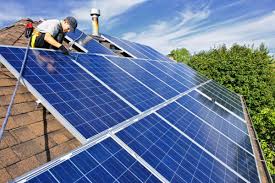Rooftop solar panels could cut poorer households’ energy bills by almost a quarter, but big upfront costs mean millions are missing out, according to new research published today
Sunny day savings by the Think Tank Resolution Foundation examines what the Government’s proposed ‘rooftop revolution’ in solar energy – which could put millions more solar panels on roofs by 2030 – means for household energy bills, and efforts to reduce fuel poverty.
The report shows that – assuming typical generation, consumption and prices – a family with a 3KW solar panel could save as much as £440 a year by both reducing the amount of energy they buy, and reselling any excess electricity generated back to the grid.
For the 3.6 million ‘fuel poor’ families who spend over a tenth of their disposable income on energy bills, the savings from rooftop solar panels could reduce their energy bills by 24 per cent, providing much-needed relief to many families still feeling the pinch of the cost of living crisis.
Rooftop solar offers returns on investment comparable with many common ‘green’ home upgrades. Solar – at 7p a year return per pound spent – measures up to cavity wall insulation (5p a year) and double-glazing (3p a year), although specific households’ circumstances will vary. But despite the high potential savings, fewer than one-in-ten (8 per cent) roofs have solar panels installed, compared to almost three-in-four (72 per cent) cavity-walls filled.
A key reason for poor take-up is the high upfront costs of solar panels, says the report. A 3KW solar panel currently costs around £6,500 – a steep ask for low-income households, three-in-five of whom have less than £1,000 in savings.
Poor take-up has been compounded by reductions in government support, which have further locked poorer households out of accessing solar panels. Back in 2015, more solar panels were installed in the poorest areas (35 per cent) than the richest (31 per cent). But by 2023, solar panels were more than twice as likely to be installed in the richest neighbourhoods than the poorest ones.
To address this, and to prevent poorer households missing out on the benefits of the ‘rooftop revolution’, the Foundation says policy makers should consider offering means-tested grants or loans to cover upfront costs. They should also ensure that households are given a fair price for any excess energy produced.
The report notes that successfully rolling out rooftop solar panels to lower-income households could lift as many as 1.2 million families in Britain out of fuel poverty and help to decarbonise Britain’s electricity at the same time.
Zachary Leather, Economist at the Resolution Foundation, said:
“Rooftop solar panels can cut poor households’ energy bills by around a quarter and their returns compare well with other bill-cutting measures. But despite this win-win scenario, too few families, particularly in poorer areas, are getting them installed.
“The government should include a new means-tested support scheme for solar panels in the upcoming Warm Homes Plan. This could really get the ‘rooftop revolution’ up and running and ensure that the consumer benefits from this net zero transition aren’t just hogged by richer households.”







